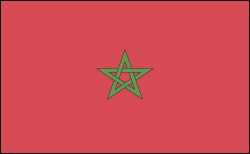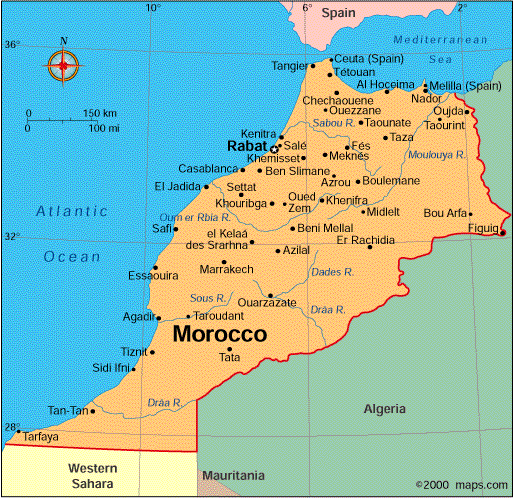MOROCCO

Geography: Morocco, about one-tenth larger than California, lies across the Strait of Gibraltar on the Mediterranean and looks out on the Atlantic from the northwest shoulder of Africa. Algeria is to the east and Mauritania to the south. On the Atlantic coast there is a fertile plain. The Mediterranean coast is mountainous. The Atlas Mountains, running northeastward from the south to the Algerian frontier, average 11,000 ft (3,353 m) in elevation.
Government: Constitutional monarchy.
History: Morocco has been the home of the Berbers since the second millennium B.C. In A.D. 46, Morocco was annexed by Rome as part of the province of Mauritania until the Vandals overran this portion of the declining empire in the 5th century. The Arabs invaded circa 685, bringing Islam. The Berbers joined them in invading Spain in 711, but then they revolted against the Arabs, resenting their secondary status. In 1086, Berbers took control of large areas of Moorish Spain until they were expelled in the 13th century.
The land was rarely unified and was usually ruled by small tribal states. Conflicts between Berbers and Arabs were chronic. Portugal and Spain began invading Morocco, which helped to unify the land in defense. In 1660, Morocco came under the control of the Alawite dynasty. It is a sherif dynasty—descended from the prophet Muhammad—and rules Morocco to this day.

Map of Morocco
Ruler: King Muhammed VI (1999)
Prime Minister: Abbas El Fassi
(2007)
Land area: 172,317 sq mi (446,301 sq km);
total area: 172,413 sq mi (446,550 sq km)
Population (2010 est.): 31,627,428 (growth
rate: 1.0%); birth rate: 19.4/1000; infant mortality rate: 28.6/1000;
life expectancy: 75.6; density per sq km: 76
Capital (2003 est.):
Rabat, 1,636,600
Largest cities: Casablanca, 3,397,000;
Fez, 941,800; Marrakech, 755,200
Monetary
unit: Dirham
National
name: al-Mamlaka al-Maghrebia
Languages:
Arabic (official), Berber dialects, French often
used for business, government, and diplomacy
Ethnicity/race:
Arab-Berber 99.1%, Jewish 0.2%, other 0.7%
Religions:
Islam 99%, Christian 1%
National Holiday:
Throne Day, July 30
Literacy rate: 52.3% (2004 est.)
Economic summary: GDP/PPP (2009 est.):
$146.7 billion; per capita $4,600. Real growth rate: 5.1%.
Inflation: 2%. Unemployment: 9.9%. Arable land:
19%. Agriculture: barley, wheat, citrus, wine, vegetables,
olives; livestock. Labor force: 11.35 million; agriculture 40%,
services 45%, industry 15% (2003 est.). Industries: phosphate
rock mining and processing, food processing, leather goods, textiles,
construction, tourism. Natural resources: phosphates, iron ore,
manganese, lead, zinc, fish, salt. Exports: $15.61 billion
(2009 est.): clothing, fish, inorganic chemicals, transistors,
crude minerals, fertilizers (including phosphates), petroleum
products, fruits, vegetables. Imports: $31.83 billion
(2009 est.): crude petroleum, textile fabric, telecommunications
equipment, wheat, gas and electricity, transistors, plastics. Major
trading partners: France, Spain, UK, Italy, India, Germany,
Russia, Saudi Arabia, China (2006).
Communications: Telephones: main lines in
use: 1.266 million (2006); mobile cellular: 16.005 million (2006).
Radio broadcast stations: AM 27, FM 25, shortwave 6 (1998).
Radios: 6.64 million (1997). Television broadcast stations:
35 (plus 66 repeaters) (1995). Televisions: 3.1 million
(1997). Internet Service Providers (ISPs): 137,187 (2007).
Internet users: 6.1 million (2006).
Transportation: Railways: total: 1,907 km
(2006). Highways: total: 57,493 km; paved: 32,716 km (includes
507 km of expressways); unpaved: 24,777 km (2004). Ports and
harbors: Agadir, El Jadida, Casablanca, El Jorf Lasfar, Kenitra,
Mohammedia, Nador, Rabat, Safi, Tangier; also Spanish-controlled Ceuta
and Melilla. Airports: 60 (2007).
International disputes: claims and
administers Western Sahara, but sovereignty remains unresolved -
UN-administered cease-fire has remained in effect since September
1991, but attempts to hold a referendum have failed and parties thus
far have rejected other proposals; Morocco protests Spain's control
over the coastal enclaves of Ceuta, Melilla, and Penon de Velez de la
Gomera, the islands of Penon de Alhucemas and Islas Chafarinas, and
surrounding waters; Morocco also rejected Spain's unilateral
designation of a median line from the Canary Islands in 2002 to set
limits to undersea resource exploration and refugee interdiction;
Morocco allowed Spanish fishermen to fish temporarily off the coast of
Western Sahara after an oil spill soiled Spanish fishing
grounds.
-------------------- o --------------------
No comments:
Post a Comment